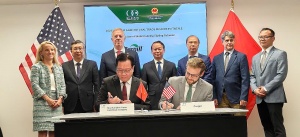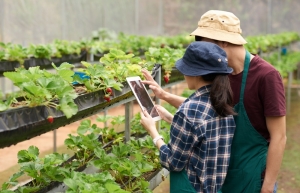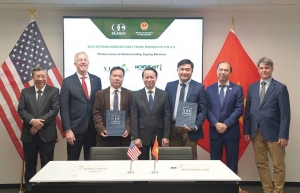INTERNATIONAL INVESTMENT
AND PORTAL
How do you assess the export prospects of agricultural products to the ASEAN market?
Vietnam’s role in ASEAN is increasingly significant, as the region is a central focus for many countries, making ASEAN a vital market in their foreign and economic policies.
 To Viet Chau, deputy director of the Department of International Cooperation under the Ministry of Agriculture and Environment
To Viet Chau, deputy director of the Department of International Cooperation under the Ministry of Agriculture and Environment
From 2021 to 2023, Vietnam achieved high export turnover to ASEAN countries, with rice being a prominent product. Over the years, ASEAN has become an important and promising export market for Vietnam’s agricultural, forestry, and aquatic (AFA) products.
The region’s diverse and robust consumer demand makes it a highly potential market for Vietnamese AFA exporters. Key products with significant export potential include rice, fruits and vegetables, seafood, pepper, coffee, timber, and wood products.
Currently, most goods exported to ASEAN enjoy preferential zero per cent tariffs under the ASEAN Trade in Goods Agreement. This agreement facilitates trade and customs procedures, enabling seamless transportation of goods within the region. This is a significant advantage for Vietnam in exporting AFA products to ASEAN member states.
Vietnam has substantial potential to expand AFA exports to ASEAN due to several advantages, such as geographic proximity, which reduces transportation and storage costs. This is particularly relevant as logistics costs to distant markets like the US and Europe continue to rise, making nearby markets a strategic choice for enhancing the competitiveness of Vietnamese agricultural products.
However, like many global AFA markets, ASEAN countries are imposing stricter requirements on the quality of imported products, particularly AFA products. To capitalise on existing advantages, Vietnam needs solutions to improve product quality to meet importers’ standards, diversify AFA offerings, and build a strong Vietnamese agricultural brand.
How has the Ministry of Agriculture and Environment (MoAE) collaborated with other ministries and international organisations to boost agricultural exports to ASEAN?
The former Ministry of Agriculture and Rural Development (now the MoAE) has taken the lead in collaborating with relevant ministries to promote tariff reduction commitments to businesses and local authorities. It has worked with other ministries to hold trade promotion activities for AFA exports to ASEAN members.
During ministerial meetings and visits, bilateral discussions with ASEAN countries have been integrated to address technical barriers and enhance the export of Vietnamese AFA products to these markets.
In addition, we also regularly participate in the ASEAN Ministers on Agriculture and Forestry annual meetings. In this conference model, there are industry working groups on related industries.
We also regularly exchange information with working groups to share information on market potential and support in resolving problems that arise for businesses.
Both Vietnam and New Zealand are active members of regional trade agreements. How can the two countries collaborate to remove non-tariff barriers and facilitate better market access?
Vietnam and New Zealand have complementary strengths in agriculture and are key partners in regional trade agreements. The two countries can collaborate by enhancing information sharing on sanitary and phytosanitary measures, technical barriers to trade, and regulations related to food safety and AFA processing for imports and exports, and establishing mutual recognition mechanisms for standards in high-potential sectors such as fruits, seafood, and processed agricultural products.
The two parties also encourage business networking and trade promotion activities for agricultural products, with support from both governments, collaborating on research and technology transfer for AFA preservation and processing to minimise post-harvest losses and enhance product value.
Vietnam expects to receive further technical support from New Zealand in building capacity in agricultural production and food safety to improve product quality, such as risk analysis in AFA safety management, developing and implementing national food safety monitoring initiatives, and training in inspection and certification for food safety.
New Zealand can also support the development of food safety control and traceability models for key agricultural and aquatic products from production to consumption, and simultaneously provide equipment, software, and training for issuing electronic certificates for Vietnamese seafood shipments.

 Vietnamese firms sign 20 MoUs worth $3 billion to buy US agri-goods
Vietnamese firms sign 20 MoUs worth $3 billion to buy US agri-goods
From June 2 to 6, Minister of Agriculture and Environment Do Duc Duy led a delegation of nearly 50 agencies, agribusinesses, and associations to the US to boost trade and increase imports of agricultural and timber products.
 Agricultural firms seek policy to utilise new resolution
Agricultural firms seek policy to utilise new resolution
As part of Vietnam’s overarching vision on private sector development, agriculture leaders are expected to review, revise, and advance the sector.
 Agricultural tie-ups ascend with the US
Agricultural tie-ups ascend with the US
A series of new landmark deals have been inked between Vietnamese and US companies, signalling a new chapter in bilateral agricultural trade.



















